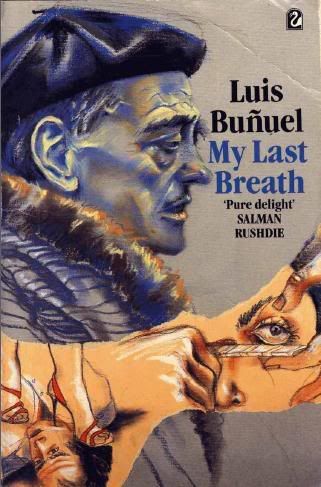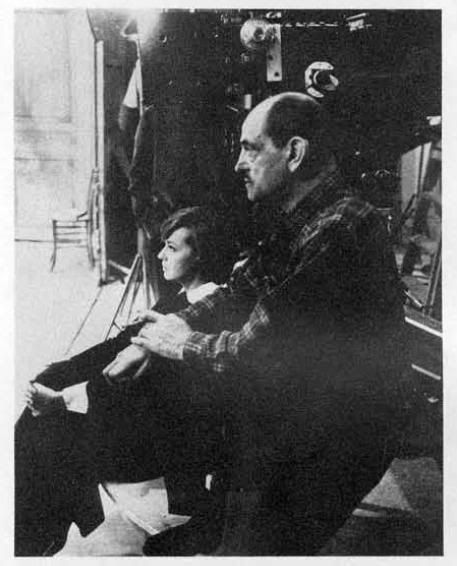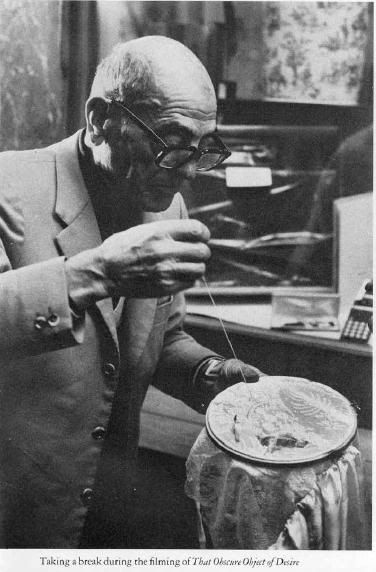
By Luis Buñuel
Translated by Abigail Israel
Published by Fontana Paperbacks (Flamingo), 1985 (285p.)
Originally published in France as Mon dernier soupir, 1982
This is Bunuel's auto-biography written with the help of Jean-Claude Carriere. It's a vivid ramble through the days of Surrealism, Hollywood sojourns, the Spanish Civil War, Mexico and the countless other adventures the old chien lived through. Expect some strong opinions about other directors and his Spanish contemporaries. Great fun but also a serious last testament from this inimitable director.
Quote:
'Covers everything from his Surrealist days with Dali to his method of making the perfect dry martini, and is as elegant, wise and mischievous as his movies'J.G. Ballard
'My Last Breath is pure delight... It's as funny and provocative as the old chien's best movies: than which there's no higher praise'
Salman Rushdie

Quote:
In May 1968 I found myself in Paris once again, checking locations for the filming of The Milky Way. One day, we suddenly came up against a barricade put together by students in the Latin Quarter, and in twenty-four hours Paris was turned upside down. I admired the work of Marcuse and agreed with everything he had to say about the consumer society and about the desperate need to redirect the sterile and dangerous course of our way of life. May 1968 was a series of extraordinary moments, not the least of which was seeing old surrealist slogans painted everywhere, slogans such as "All power to the imagination!" and "It is forbidden to forbid!"At this point, our work on the film had ground to a halt, and I found myself alone in Paris, like a curious but uneasy tourist. I didn't know what to do with myself. Tear gas made my eyes sting when I crossed the boulevard St.-Michel. There were many things I just didn't understand, like why the demonstrators were shouting "Mao! Mao!"~asif they really were demanding that France adopt a Maoist regime. Normally reasonable people lost their heads, and even Louis Malle, a very dear friend, became the leader of some action group. He spent his time organizing his troops for the final assault, and even ordering my son Juan-Luis to shoot the minute the cops turned the corner. (Had he obeyed, he would have been the only victim of the guillotine during this revolution.) The city was filled with serious debate as well as complete confusion. Everyone was seeking his own revolution with only his own small lantern for a guide. I told myself that if this had been happening in Mexico, it wouldn't have lasted more than two hours, and there would surely have been afew hundred casualties to boot, which is exactly what happened, of course, in October on the Plaza de las Tres Culturas. And yet in Paris a week later, everything was back to normal, and the great, miraculously bloodless, celebration was over.

Quote:
In my frequent moments of idleness, I devoted myself to a bizarre document+ synoptic table of the American cinema. There were several movable columns set up on a large piece of pasteboard; the first for "ambience" (Parisian, western, gangster, war, tropical, comic, medieval, etc.), the second for "epochs," the third for "main characters," and so on. Altogether, there were four or five categories, each with a tab for easy maneuverability. What I wanted to do was show that the American cinema was composed along such precise and standardized lines that, thanks to my system, anyone could predict the basic plot of a film simply by lining up a given setting with a particular era, ambience, and character. It also gave particularly exact information about the fates of heroines. In fact, it became such an obsession that Ugarte, who lived upstairs, knew every combination by heart.One evening, Sternberg's producer invited me to a sneak preview of Dishonored, with Marlene Dietrich, a spy story which had been rather freely adapted from the life of Mata Hari. After we'd dropped Sternberg off at his house, the producer said to me:
"A terrific film, don't you think?"
'Terrific," I replied, with a significant lack of gusto.
"What a director! What a terrific director!"
"Yes."
"And what an original subject!"
Exasperated, I ventured to suggest that Sternberg's choice ofsubject matter was not exactly distinguished; he was notorious for basing his movies on cheap melodramas.
"How can you say that!" the producer cried. "That's a terrific movie! Nothing trite about it at all! My God, it ends with the star being shot! Dietrich! He shoots Dietrich! Never been done before!"
" I m sorry," I replied, "I'm really sorry, but five minutes into it, I knew she'd be shot!"
"What are you talking about?" the producer protested. "I'm telling you that's never been done before in the entire history of the cinema. How can you say you knew what was going to happen? Don't be ridiculous. Believe me, Bunuel, the public's going to go crazy. They're not going to like this at all. Not at all!"
He was getting very excited, so to calm him down I invited him in for a drink. Once he was settled, I went upstairs to wake Ugarte.
"You have to come down," I told him. "I need you."
Grumbling, Ugarte staggered downstairs half-asleep, where I introduced him to the producer.
"Listen," I said to him. "You have to wake up. It's about a movie. "
"All right," he replied, his eyes still not quite open.
"Ambience~Viennese. "
"All right. "
"Epoch-World War I."
"All right."
"When the film opens, we see a whore. It's very clear she's a whore. She's rolling an officer in the street, she . . ."
Ugarte stood up, yawned, waved his hand in the air, and started back upstairs to bed.
"Don't bother with any more," he mumbled. "They shoot her at the end."
http://rapidshare.com/files/401906142/My_Last_Breath.pdf
no pw



0 comments:
Post a Comment